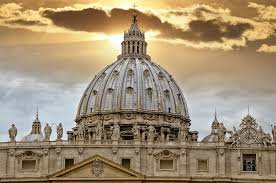“So he said, ‘I am, as Isaiah prophesied: A voice of one that cries in the desert: Prepare a way for the Lord‘” (Jn 1:23).
“He was not the light, he was to bear witness to the light” (Jn 1:8).
In the Office of Readings for the Third Sunday of Advent, St. Augustine speaks eloquently of the word and the voice: “John is the voice that lasts for a time; from the beginning Christ is the Word who lives fore ever. Take away the word, the meaning, and what is the voice?”
The purpose of the voice is to convey the word, meaning. A voice well used carries the realities present in the heart and mind of the speaker to the heart and mind of the listener, and the word grows through being shared. The humility of the voice is in recognizing, as John the Baptist does, that he must decrease, while the word must increase (Jn 3:30). The voice exists for the sake of the word, and when its mission is complete it passes away.
The Gospel also says that “[John] was not the light, he was to bear witness to the light” (Jn 1:8). On this Third Sunday of Advent, we have the tradition of using rose vestments for the Mass. Rose is the colour of the dawn. The dawn captures us with its beauty. It prepares us for the rising of the sun, but it too, like the voice, must pass away.
St. Augustine says, “The voice of one crying in the wilderness is the voice of one breaking the silence.” The voice breaks the silence, and the dawn breaks the darkness, and both are meant to prepare the way of the Lord. In his humility, his penance, and his steadfast prayer John the Baptist shows us how to prepare the way of the Lord. If the voice exists only for itself, then it is meaningless. A voice without the word is just noise. Likewise, the dawn without the sunrise is a night that never ends. How easily we fall into the trap of speaking merely for the sake of drawing attention to ourselves or, as the way goes, because we love the sound of our own voice. Or how easily we are taken up in the beauty of a thing without seeing beyond to the source of its beauty. We must always be vigilant to prepare the way of the Lord by humbling ourselves like John the Baptist, opening our hearts through prayer and penance to receive the Word.
This reality of the voice and the dawn is manifested fully in the Mass. John is a priestly figure from the Tribe of Levi, preparing the way for the Word. The New Covenant priesthood takes what is foreshadowed in John and brings it to completion. The priest, through his voice and actions, conveys the Word to his people. The way is prepared through the prayers and rituals, and what entered the sanctuary as mere bread and wine is transformed by the voice of the priest into the Word Himself. Then, following the words of consecration the priest elevates the Body and Blood of Christ—a round host and a golden chalice rising like the sun out of the dawn. “Prepare a way for the Lord” (Jn 1:23).










